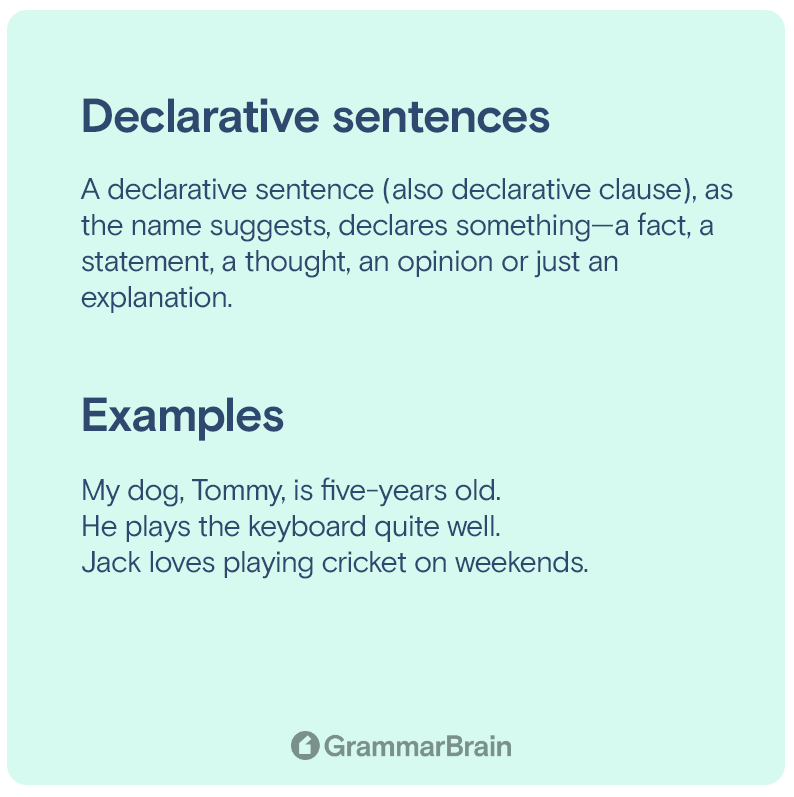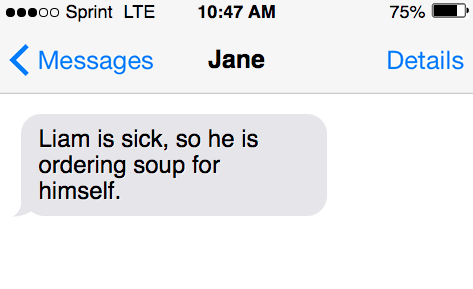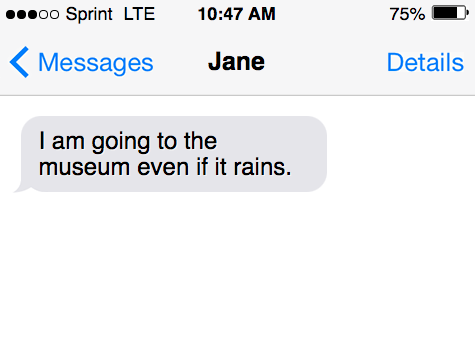The key to good writing is the ability to convey meaning, tone and purpose without ambiguity. This requires standardized rules about sentence structure, usage and punctuation.
The English language has four types of sentences based on its function—declarative, interrogative, exclamatory and imperative.
For the purpose of this article, let’s first discuss declarative sentences, their types, examples and usage rules before briefly exploring other types of sentences.
Try the practice quiz at the end to test your knowledge on the declarative sentences.
| Interrogative | Declarative | Imperative | Exclamatory |
| Asks a question | Tells a statement | Gives a command | Shows excitement |
What is a declarative sentence?
A declarative sentence (also declarative clause), as the name suggests, declares something—a fact, a statement, a thought, an opinion or just an explanation.
Structured like a regular sentence, declaratives sentences have the subject precede the verb and are usually written in the present tense. It is also always followed by a period.
When you need to declare a statement that conveys some kind of information to the reader, you can use declarative sentences.

Examples of declarative sentences
- My dog, Tommy, is five-years old.
- He plays the keyboard quite well.
- Jack loves playing cricket on weekends.
- I think the sudden spurt in heat wave phenomena across the world can be attributed to climate change.
- I can’t attend Lizzie’s wedding next weekend as I have my semester exams around the corner.
- She has a laugh that can light up the whole room.
- I am a first year Architecture student at the University of Oregon.
- He spends his evening playing chess with his father.
- Prevention is better than cure.
- My son is missing his front teeth.
- Today is the first Sunday of October.
- It rains twice a year in my hometown.
- She loves to travel but he hates going out.
- The teacher is grading the assignment quite leniently.
- Antarctica experiences complete darkness for six continuous months in a year.
- The sharp edges of the table are potentially dangerous especially when the kids are in the house.
- Pitbulls are an aggressive breed of dogs.
What are compound declarative sentences?
A compound declarative sentence as the name suggests joins two independent clauses that declare a statement using a conjunction.
Examples
- The results of the SATs are on the board but John’s name is missing from it.
- I love watching horror movies but my brother thinks they are predictable and filled with clichés.
- I am either going to complete my homework now or take a short, power nap before I start.
- Liam is sick, so he is ordering soup for himself.
- I am late for class and I am in big trouble.

What is a complex declarative sentence?
Complex declarative sentences have a single independent clause and two or more dependent clauses which declare a statement.
Examples
- Whenever it rains, Sheila prefers to sit on her balcony.
- After watching the movie, I will come back home by 5 pm.
- I am going to the museum even if it rains.
- Although she was late, she managed to submit the work before the teacher left the class.
- While Tom was sleeping, Jim single-handedly cooked an entire three-course meal for all of us.

Declarative sentence grammar rules
Word order
Like any other regular sentence, a declarative sentence has a subject, predicate and punctuation.
The subject is a person, place or thing who performs the main action in the sentence. It can be a noun, pronoun or noun clause that acts on the verb of the sentence.
The predicate contains the verb and the main clause of the sentence.
In declarative sentences, the subject will precede the main clause.
Punctuation is also a defining differentiation that helps identify the type of sentence. Declarative sentences always end with a period and never with a question mark or exclamation point.
Other sentence types
Imperative sentence
The word imperative means “giving an authoritative command”. Imperative sentences are used to tell somebody to carry out a particular action. Use it to communicate commands, orders, requests, instructions to a person, pet or thing.
When your teacher assigns homework, when your mother asks you to clean your room, when your parent’s boss asks them to finish a work or when you tell a friend to pick you up at home— You will be using imperative sentences.
Imperative sentences always end with a full stop.
Examples
- Finish tracing the major rivers of the world on a map and submit it on Thursday.
- Sit down, Tommy.
- Alexa, play a slow song.
- Fold your clothes and organize your shelves by evening.
- Complete the project submission by tonight.
- Pick me up at home at 5 for the baseball game.
- Leave the keys on the table before you go to the next class.
- Remember to buy milk on your way back home.
- Tell me if I should buy the novel or watch the movie first.
Interrogative sentence
Interrogative sentences are those that ask a question and elicit a response from the addressee.
They are usually structured with an auxiliary verb, subject and the main verb.
E.g. Do you speak Spanish?
Interrogative questions can use any tense and may have a positive or negative connotation.
Rhetorical questions i.e. those that resemble questions but the speaker does not seek a response but instead uses it to make a point. So, these types of questions are not considered interrogative.
Also remember that indirect questions are not interrogative. E.g. She asked me if I was coming to the wedding. This is a declarative sentence and not an interrogative one.
An easy way to identify is that interrogative sentences always end with a question mark.
Examples
- When will it rain?
- May I borrow this pen?
- Who will preside over the award ceremony?
- Where will the wedding be held?
- What is the name of the book which won the Man Booker Prize this year?
- How will they bring the miniature model to the office?
- Which of these trains will take me to Coney Island?
- Won’t he attend the graduation ceremony of his sister?
- Do you not take sugar with your coffee?
Exclamatory sentence
Exclamatory sentences are used to express a heightened emotion like a sudden feeling of surprise, excitement, happiness, pain, anger or any other emotion.
You can easily identify an exclamatory sentence as it always ends with an exclamation mark.
Apart from the mood, exclamatory sentences will have intonation and inflection on certain words or syllables as it expresses the intensity of emotion.
Exclamatory sentences can use interjections such as “Ouch”, “Yikes” and “wow” which can have their own exclamation point or be connected to the rest of the phrase with a comma.
Use exclamatory sentences in casual writing and try to avoid them in formal contexts.
Examples
- Ouch! That was painful!
- He hit the bullseye on his first try!
- What a pity!
- How dare he speak to his mother that way!
- You did a great job!
- How does he do that every time!
- I can’t believe we pulled off this feat in such a short time!
- Yikes, that was so close!
- Geez! I totally forgot to send in my homework by the deadline!
- Happy birthday, Peter!
Why declarative sentences are important
Sentences come in differing lengths and types but they are not merely used for variability. It is the purpose of the sentence and the meaning it conveys that determines the type of the sentence.
Long sentences can be used for descriptive purposes while shorter ones are more impactful. The four types of sentences that we saw above each have their own function and purpose.
Declarative sentences are basic building blocks of writing—establishing context, delivering meaning and purpose. They address the reader in a direct way and convey the information without any ambiguity.
This is why declarative sentences are one of the most commonly used sentences from creative, academic to business contexts.

Quiz: Which of the following are declarative sentences?
- Put the phone down. (Imperative)
- The phones have to be in silent mode. (Declarative)
- She asked me if I had a pen. (Declarative)
- Keep your voice down. (Imperative)
- It hurts! (Exclamatory)
- Wow! I am lucky. (Declarative with interjection)
- Is it raining now? (Interrogative)
- When will you return the library book? (Interrogative)
- Sit down! (Exclamatory)
- You will help me with this, won’ you? (Interrogative)
FAQs
What is a simple declarative sentence?
A simple declarative sentence is a sentence that consists of a subject and a predicate.
Sources
- How Should You Use the 4 Types of Sentences: a Short Guide With Exercises
- Declarative Sentence
- What Are Imperative Sentences?
- How to Write an Exclamatory Sentence
- Declarative Sentence (statement)
- Complex Sentence: Definition and Examples of Complex Sentences
Inside this article
Fact checked:
Content is rigorously reviewed by a team of qualified and experienced fact checkers. Fact checkers review articles for factual accuracy, relevance, and timeliness. Learn more.
Core lessons
Glossary
- Abstract Noun
- Accusative Case
- Anecdote
- Antonym
- Active Sentence
- Adverb
- Adjective
- Allegory
- Alliteration
- Adjective Clause
- Adjective Phrase
- Ampersand
- Anastrophe
- Adverbial Clause
- Appositive Phrase
- Clause
- Compound Adjective
- Complex Sentence
- Compound Words
- Compound Predicate
- Common Noun
- Comparative Adjective
- Comparative and Superlative
- Compound Noun
- Compound Subject
- Compound Sentence
- Copular Verb
- Collective Noun
- Colloquialism
- Conciseness
- Consonance
- Conditional
- Concrete Noun
- Conjunction
- Conjugation
- Conditional Sentence
- Comma Splice
- Correlative Conjunction
- Coordinating Conjunction
- Coordinate Adjective
- Cumulative Adjective
- Dative Case
- Determiner
- Declarative Sentence
- Declarative Statement
- Direct Object Pronoun
- Direct Object
- Diction
- Diphthong
- Dangling Modifier
- Demonstrative Pronoun
- Demonstrative Adjective
- Direct Characterization
- Definite Article
- Doublespeak
- False Dilemma Fallacy
- Future Perfect Progressive
- Future Simple
- Future Perfect Continuous
- Future Perfect
- First Conditional
- Irregular Adjective
- Irregular Verb
- Imperative Sentence
- Indefinite Article
- Intransitive Verb
- Introductory Phrase
- Indefinite Pronoun
- Indirect Characterization
- Interrogative Sentence
- Intensive Pronoun
- Inanimate Object
- Indefinite Tense
- Infinitive Phrase
- Interjection
- Intensifier
- Infinitive
- Indicative Mood
- Participle
- Parallelism
- Prepositional Phrase
- Past Simple Tense
- Past Continuous Tense
- Past Perfect Tense
- Past Progressive Tense
- Present Simple Tense
- Present Perfect Tense
- Personal Pronoun
- Personification
- Persuasive Writing
- Parallel Structure
- Phrasal Verb
- Predicate Adjective
- Predicate Nominative
- Phonetic Language
- Plural Noun
- Punctuation
- Punctuation Marks
- Preposition
- Preposition of Place
- Parts of Speech
- Possessive Adjective
- Possessive Determiner
- Possessive Case
- Possessive Noun
- Proper Adjective
- Proper Noun
- Present Participle
- Prefix
- Predicate



